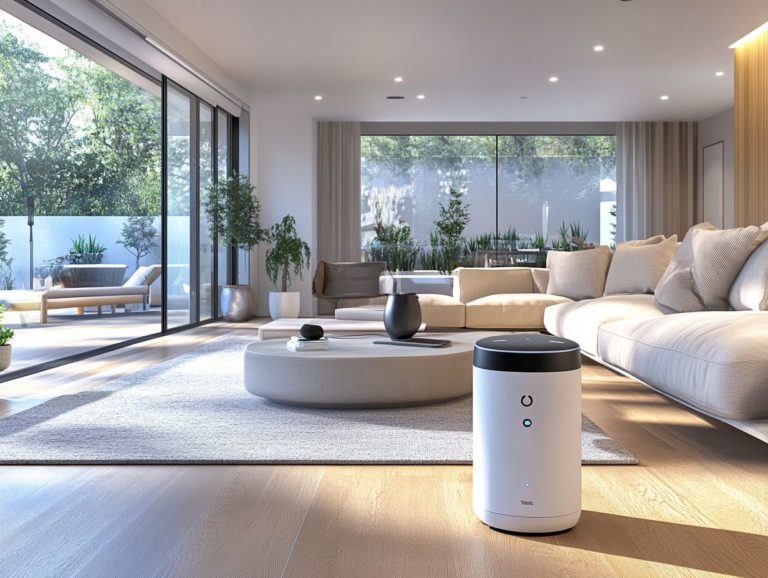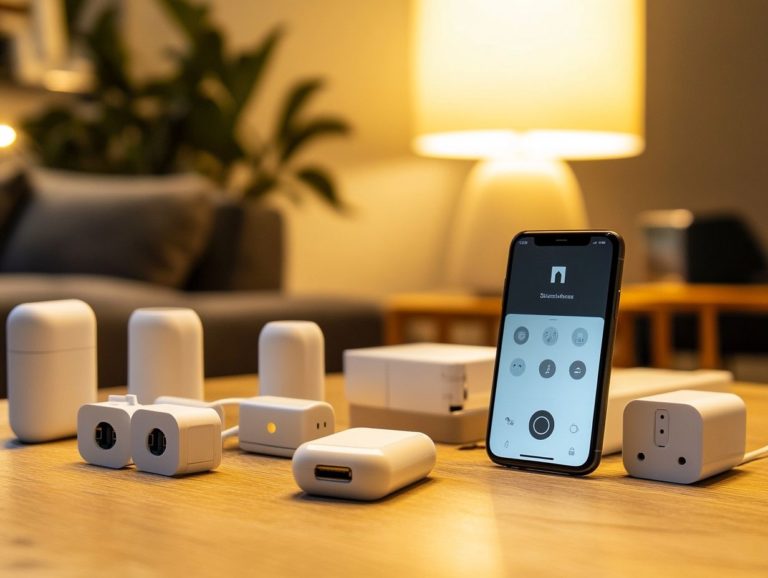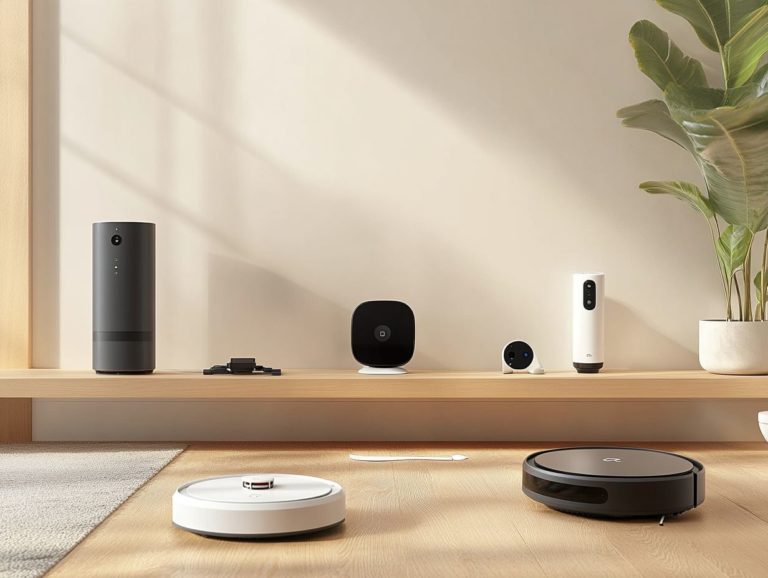The Role of AI in Smart Home Devices
Smart home devices are fundamentally transforming the way you interact with your living spaces, making your life more efficient and secure than ever.
At the core of this transformation lies advanced technology that enhances everything from energy management to home security.
This article delves into the myriad benefits of smart home technology, explores the various types currently in use, and addresses the challenges that accompany these innovations.
You ll also catch a glimpse into the future of smart home advancements, uncovering how they might seamlessly weave into your daily routine.
Whether you re a tech enthusiast or simply curious about the concept of smart homes, there s a wealth of insights waiting for you to explore.
Contents
- Key Takeaways:
- Benefits of Using AI in Smart Home Devices
- Types of AI Used in Smart Home Devices
- Challenges and Limitations of AI in Smart Home Devices
- Future of AI in Smart Home Devices
- Frequently Asked Questions
- How does AI help smart home devices?
- How does AI technology benefit smart home devices?
- What are some common examples of AI-powered smart home devices?
- How does AI technology improve the security of smart home devices?
- Can AI-powered smart home devices save energy?
- What are some potential concerns about the role of AI in smart home devices?
Key Takeaways:
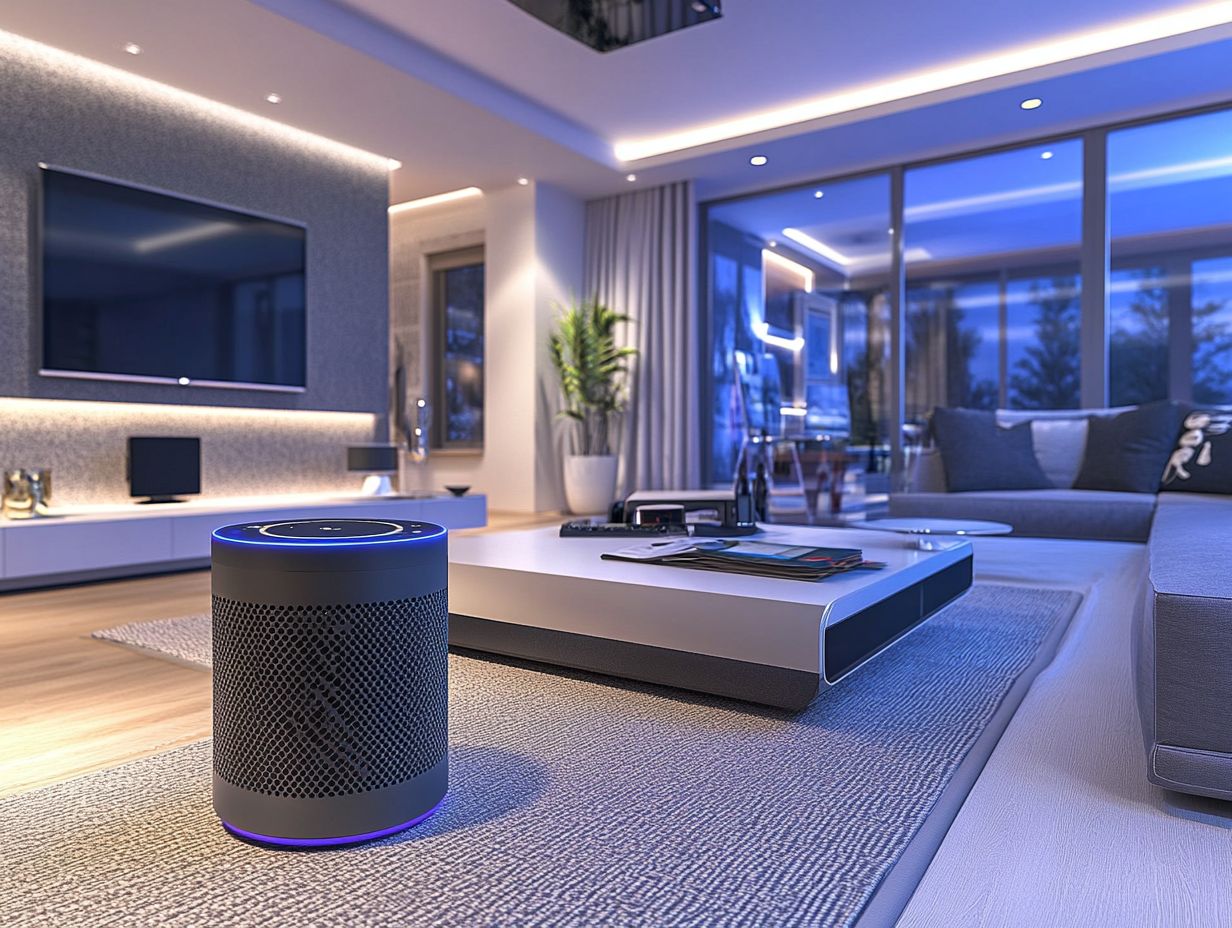
- Smart home devices powered by AI offer increased efficiency and convenience, making everyday tasks easier for users.
- AI technology in smart home devices also enhances home security, providing peace of mind for homeowners.
- While AI holds great potential for smart homes, challenges such as data privacy and reliance on internet connectivity must be addressed for widespread adoption.
What are Smart Home Devices?
Smart home devices are cutting-edge gadgets that elevate your home automation experience and enrich your daily life through seamless connectivity and convenience.
These devices harness the power of the Internet of Things (IoT) a network of devices that connect to the internet to share information giving you the ability to control various aspects of your home, from lighting to security.
With smart thermostats, smart lighting, and smart speakers at your fingertips, you can easily manage energy use, improve energy efficiency, and enhance overall home security.
Smart locks provide keyless entry and remote locking, ensuring your peace of mind whether you re at home or on the go.
Smart cameras offer real-time surveillance and alerts for any unusual activity that may arise.
Additionally, smart refrigerators connect to the internet, enabling you to track inventory, create shopping lists, and receive recipe suggestions based on what you have on hand.
This seamless integration of devices creates a cohesive ecosystem that elevates your user experience, fostering a lifestyle where convenience and safety converge.
Benefits of Using AI in Smart Home Devices
The integration of artificial intelligence (AI) in smart home devices brings numerous advantages, turning ordinary homes into sophisticated living environments that enhance convenience, security, and energy efficiency.
By using AI algorithms and machine learning, these devices adapt to your preferences, use energy wisely, and anticipate maintenance needs, resulting in improved customer satisfaction.
AI-driven systems make home automation tasks simple, allowing effortless interaction with your interconnected devices while promoting environmental sustainability.
Increased Efficiency and Convenience
Incorporating smart home devices equipped with AI technology offers remarkable efficiency and convenience. These devices, like smart thermostats and smart lighting, adjust to your preferences, automating routine tasks and using energy wisely to create a more comfortable living environment.
For example, smart appliances can alter their settings based on real-time data, ensuring your home operates at peak efficiency while reducing energy costs.
Consider using smart plugs and energy monitors that let you track your electricity usage in real-time. They offer valuable insights that guide you toward smarter choices and greater energy savings.
Voice-activated assistants further enhance this experience, allowing you to manage your environment effortlessly with simple commands, making your daily routines smoother.
These technologies cater to your personalized needs while also reducing your environmental footprint by minimizing waste, proving that convenience can seamlessly align with sustainability in modern homes.
Imagine transforming your home into a smart hub where every device works in harmony to make your life easier. Explore smart home devices further and stay updated on the latest advancements in this exciting field!
Improved Home Security
Improved home security stands out as a vital advantage of integrating AI into your smart home devices. It offers robust solutions to tackle security threats while enhancing your peace of mind.
With smart cameras, motion sensors, and smart locks, these integrated systems allow you to monitor activity in real-time and control access remotely. This enables you to respond swiftly to potential breaches.
AI-driven algorithms analyze patterns and behaviors, giving you the power to take proactive measures against unauthorized access. This elevates your overall home safety.
This technology not only deters intruders but also creates a comprehensive safety net that adapts to your unique lifestyle. By learning the habits and routines of your household members, the system can differentiate between normal activities and suspicious behaviors.
Users are thrilled with the newfound sense of security! Features like automated alerts and remote viewing capabilities keep them informed, even when they are away from home.
Case studies highlight significant reductions in theft incidents, demonstrating how these innovative products contribute to a safer living environment for families everywhere.
Types of AI Used in Smart Home Devices

A range of artificial intelligence types plays a role in smart home devices, allowing them to execute tasks with impressive efficiency.
Machine learning algorithms are particularly important. These devices analyze your behavior and preferences, enabling them to adapt and optimize their performance over time.
Natural language processing makes communication between you and your smart devices seamless. This means your interactions become much more intuitive, especially when using voice-activated virtual assistants.
Machine Learning
Machine learning plays a pivotal role in many smart home devices. It enables them to learn from your interactions and optimize their functions accordingly.
By analyzing data gathered over time, these smart devices can employ AI algorithms to anticipate maintenance needs and automatically adjust settings. This provides a customized experience that enhances convenience and energy efficiency.
For instance, smart thermostats adapt to your schedules and preferences, adjusting heating and cooling to ensure your home remains at the ideal temperature.
This technology extends beyond thermostats. Smart appliances like refrigerators and washing machines are also equipped with machine learning capabilities. These devices can monitor your usage patterns and suggest optimal settings, such as fine-tuning washing cycles based on load size.
Predictive maintenance becomes a reality, as these appliances can notify you of potential issues before they become serious. This significantly cuts down on repair costs.
In this way, machine learning boosts performance and personalizes your experience, making your living space more comfortable and efficient.
Natural Language Processing
Natural language processing (NLP) is an essential technology that gives your smart home devices the power to understand and respond to your voice commands. This significantly elevates your user experience.
With NLP, voice-activated smart speakers like Google Assistant and Alexa can grasp your requests, execute commands, and deliver real-time information. This makes home automation intuitive and accessible.
This interaction creates a seamless connection between you and your smart devices, streamlining tasks and enhancing convenience.
The power of NLP goes beyond mere commands. It integrates context and user intent to craft a more personalized experience. For example, smart thermostats equipped with NLP can learn your preferences over time and adjust temperatures based on your past behaviors.
Devices such as smart security systems allow you to communicate commands naturally. Whether you’re asking for security updates or remotely locking your doors, these systems foster your peace of mind.
As these technologies continue to advance, they promise even greater accessibility, particularly for individuals with disabilities. This reshapes how daily routines are managed and elevates the notion of a truly smart home.
Challenges and Limitations of AI in Smart Home Devices
While the advantages of AI in smart home devices are enticing, it’s crucial to recognize the challenges and limitations that come with them, particularly regarding data privacy and security.
As these devices become more reliant on constant Internet connectivity, they expose themselves to potential security threats that could jeopardize your personal information and the safety of your home.
Smart technologies raise concerns about data storage, access control, and user privacy.
To navigate this landscape effectively, you must implement robust network security measures to shield yourself from potential cyber attacks.
Data Privacy and Security Concerns
Data privacy is a real concern for smart home users like you! The way these devices connect with each other requires you to manage your personal information with diligence.
With smart devices collecting vast amounts of data, unauthorized access to sensitive information can lead to severe privacy breaches and jeopardize your home security. It s essential for you to ensure robust network security measures to protect your data and maintain trust in your smart home systems.
As the network of devices that connect to the Internet continues to grow, you may find that instances of data breaches involving these devices are becoming increasingly frequent. High-profile cases have revealed vulnerabilities, with hackers gaining access to home cameras and exposing intimate moments and sensitive information.
Such incidents not only invade your privacy but also compromise your overall safety, resulting in heightened apprehension among consumers like you. To address these pressing concerns, it s vital for both you and manufacturers to adopt best practices.
- Regularly update your device firmware.
- Change default passwords.
- Utilize strong, unique passwords for your networks.
Manufacturers must prioritize transparency in their data handling processes and implement stringent security protocols during product development.
Reliance on Internet Connectivity

Relying on a steady Internet connection can lead to frustrating moments. When your Internet connection falters, you may find yourself facing downtime or losing access to your smart devices, which undermines the very convenience and automation these technologies promise.
Poor network reliability can lead to delayed responses from your devices, ultimately affecting your experience and overall efficiency.
A brief service interruption can not only disrupt convenience but also compromise security, especially if your surveillance systems become unresponsive.
To tackle these challenges, consider implementing mesh networking solutions to enhance coverage and reliability throughout your home. By utilizing multiple nodes that communicate with one another, you can ensure your smart devices stay connected, promoting a seamless home automation experience that continues to function smoothly, even during potential outages.
Future of AI in Smart Home Devices
The future of AI in smart home devices is set to experience remarkable growth and innovation, propelled by continuous technological advancements and the deeper integration of AI systems.
As the network of devices that connect to the Internet evolves, you can expect smart home systems to become increasingly interconnected and user-friendly, significantly enhancing your overall experience.
This evolution paves the way for more sophisticated AI applications, giving you the power to make smarter decisions, enjoy predictive capabilities, and experience unparalleled automation convenience in your daily life.
Potential Advancements and Integration with Other Technologies
The potential advancements in AI for smart home devices are brimming with exciting innovations, particularly in the realms of robotics and health monitoring. As technology continues to evolve, you might witness enhanced AI integration that gives the power to your smart devices to perform increasingly complex tasks.
Imagine automated cleaning with devices like the iRobot Roomba or sophisticated health monitoring systems that track important health measurements and deliver real-time feedback. These advancements will revolutionize home automation and contribute to environmental sustainability and energy efficiency.
Picture living in a home where robotic assistants not only handle cleaning but also manage your grocery inventories, suggesting meal plans tailored to your dietary needs. Integrated health monitoring could facilitate seamless communication between your wearable devices and household systems, ensuring you’re promptly alerted to any health irregularities.
This level of connectivity fosters a cohesive living environment, enhancing convenience while prioritizing your safety and well-being. These innovations can transform your daily routines, crafting a future where smart homes cater to your individual lifestyle intuitively.
Watch this video to learn more about smart home technology!
Frequently Asked Questions
How does AI help smart home devices?
The role of AI in smart home devices is to act as the brain behind the automation and control of these devices. AI technology allows smart home devices to learn and adapt to the preferences and behaviors of users, making them more personalized and efficient.
How does AI technology benefit smart home devices?
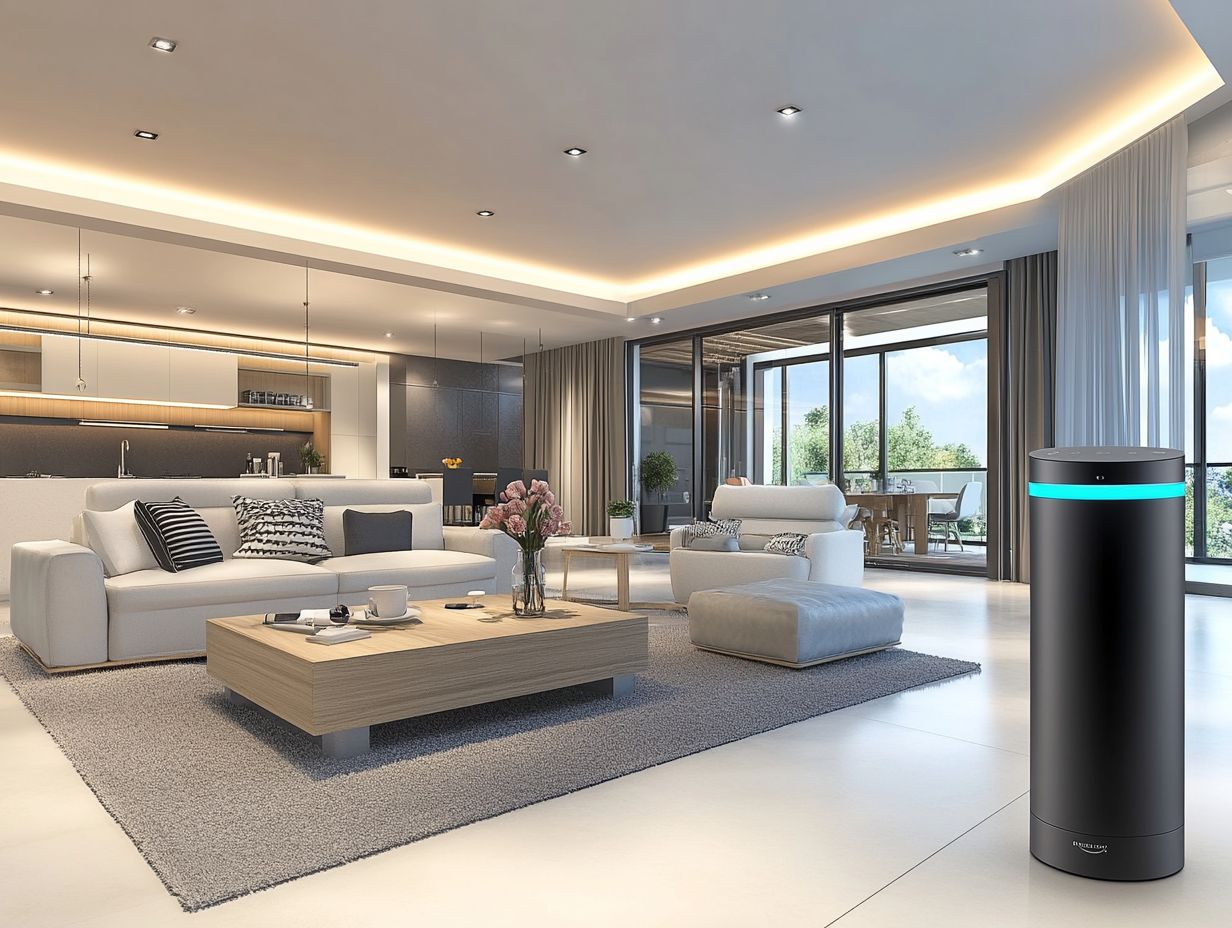
AI technology benefits smart home devices by providing advanced features such as voice recognition, facial recognition, and the technology that helps devices understand and respond to spoken language. This allows for more convenient and intuitive control of devices, making them easier to use for users of all ages.
What are some common examples of AI-powered smart home devices?
Common examples of AI-powered smart home devices include virtual assistants like Amazon Alexa and Google Assistant, smart thermostats, smart security cameras, and robot vacuums. These devices use AI technology to learn and improve their functionality over time.
How does AI technology improve the security of smart home devices?
AI technology improves the security of smart home devices by providing features like facial recognition and voice recognition, which can identify and differentiate between authorized users and potential intruders. AI algorithms also analyze patterns and behaviors to detect any unusual activity, enhancing the security of the home.
Can AI-powered smart home devices save energy?
Yes, AI-powered smart home devices can save energy by learning and adapting to the energy usage patterns of users. This allows them to optimize energy consumption and make suggestions for more efficient use of devices, ultimately leading to cost savings on electricity bills.
What are some potential concerns about the role of AI in smart home devices?
Some potential concerns about the role of AI in smart home devices include privacy issues, as these devices collect and store personal data. There are also concerns about the reliance on AI and potential malfunctions or errors in the technology leading to unexpected consequences. It is important for users to carefully consider the risks and precautions when using AI-powered smart home devices.
Ready to upgrade your home? Discover how smart devices can make your life easier today!


